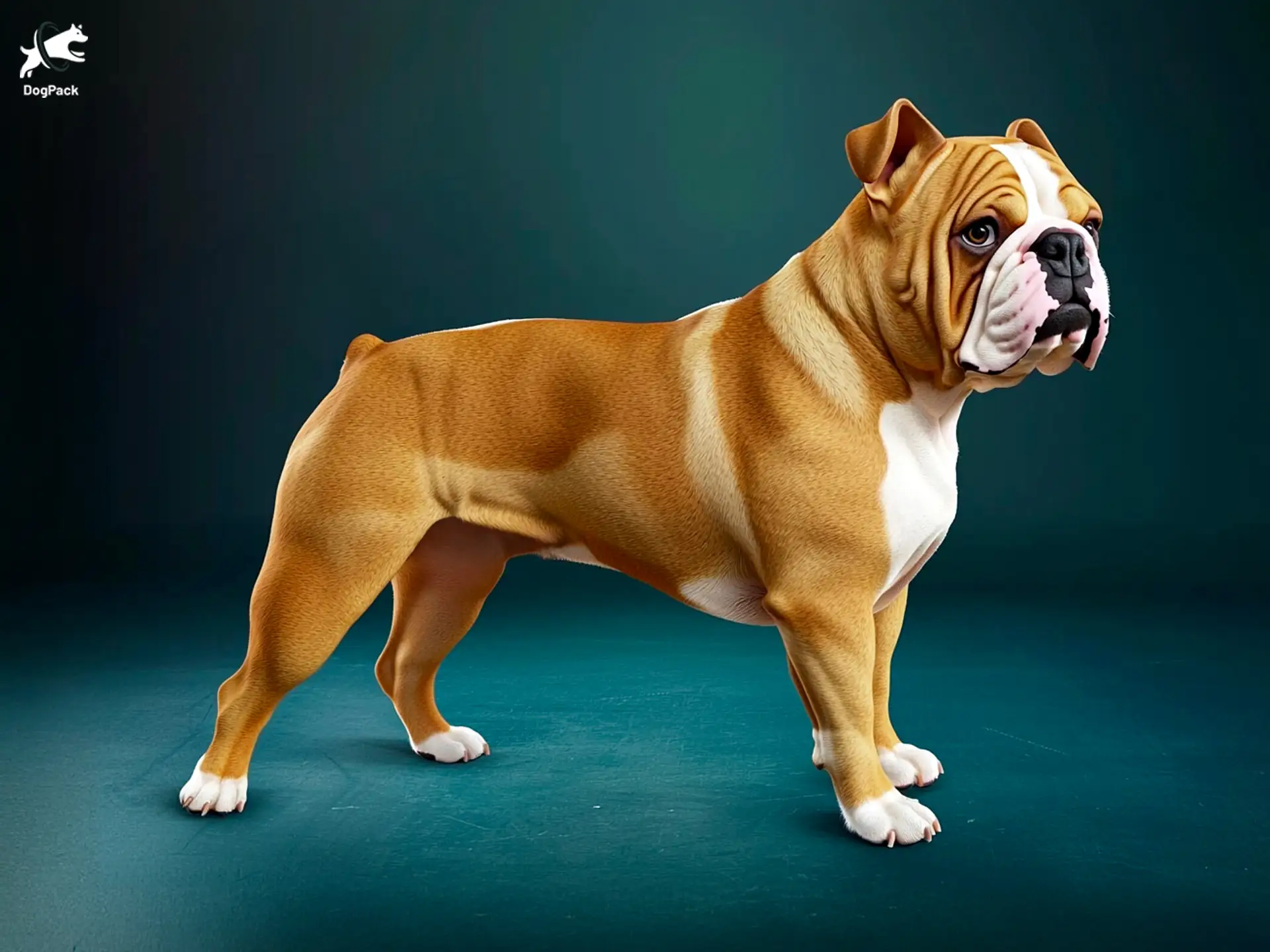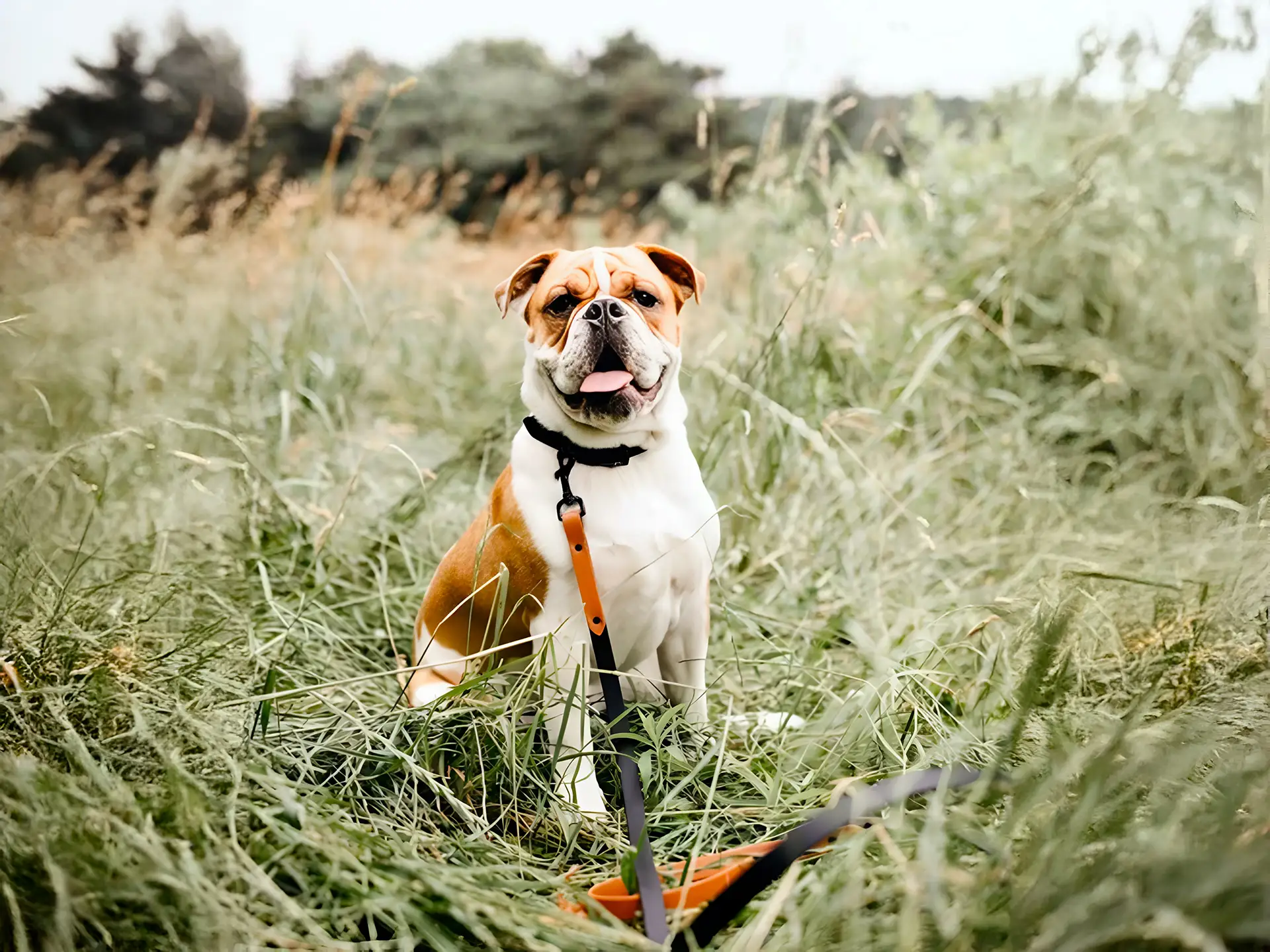Bulldog Dog Breed Info & Overview
The Bulldog is a charming, laid-back breed known for its iconic wrinkled face and warm, affectionate personality. Content to relax by your side, Bulldogs are also up for some playful moments, making them wonderfully adaptable companions. With their gentle temperament and loyalty, Bulldogs are well-suited for various living situations, bringing a unique blend of love and companionship to any home.
Characteristics
Pictures
Breed History
Originating from England, Bulldogs have a storied past that dates back to the 13th century. Initially bred for bull-baiting—a now-outlawed sport—their tenacity and courage were unmatched. Over time, as the sport faded, breeders transformed the Bulldog into the affectionate companion we know today.
The transition from a fierce bull-baiter to a gentle family pet wasn’t overnight. Dedicated breeders selected for traits like docility and friendliness, reshaping the Bulldog’s temperament. By the 19th century, Bulldogs became symbols of British resilience and determination.
Today, the Bulldog is celebrated worldwide for its loving nature and distinctive appearance. Their iconic wrinkles and sturdy build make them instantly recognizable. Despite their rough beginnings, Bulldogs have found a place in homes and hearts across the globe.
Temperament, Personality
Bulldogs are renowned for their calm and friendly demeanor. They form strong bonds with their families and are known to be exceptionally patient with children. Their easygoing nature makes them excellent companions for people of all ages.
While they may appear intimidating due to their muscular build, Bulldogs are quite the softies at heart. They enjoy lounging around the house and are content with being close to their loved ones. Socialization from a young age ensures they get along well with other pets.
Although not overly energetic, Bulldogs can have playful spurts and appreciate interactive toys or a gentle game of fetch. They tend to be people-oriented and may not enjoy being left alone for extended periods. Their affectionate personality makes them a joy to be around.
Physical Characteristics
The Bulldog is a medium-sized breed with a distinctive appearance. Their short, sturdy legs and muscular build give them a solid stance. One of their most notable features is their wrinkled face, complete with a pushed-in nose and expressive eyes.
Their coat is short and smooth, coming in a variety of colors including brindle, white, red, fawn, and piebald. Despite their rugged looks, Bulldogs have a soft coat that’s pleasant to the touch. Their tail is usually short and can be straight or screwed.
Bulldogs have a broad chest and shoulders, giving them a robust silhouette. Their jaw is undershot, meaning the lower jaw protrudes beyond the upper jaw, contributing to their unique facial expression. Overall, their appearance is unmistakable and endearing.
Health Issues
Bulldogs are prone to certain health issues due to their unique physical traits. Brachycephalic syndrome, related to their short snouts, can cause breathing difficulties, especially in hot or humid weather. It’s important to keep them cool and avoid overexertion.
Joint problems like hip dysplasia and elbow dysplasia are also common in Bulldogs. Regular veterinary check-ups and maintaining a healthy weight can help mitigate these issues. Skin infections can occur in their wrinkles if not cleaned properly.
Eye conditions such as cherry eye and entropion are also seen in Bulldogs. Responsible breeders conduct health screenings to reduce the incidence of these issues. Regular care and attention can help your Bulldog lead a comfortable life.
Grooming Needs
Bulldogs have relatively low grooming needs, thanks to their short coat. Weekly brushing helps remove loose hair and keeps their coat looking its best. During shedding seasons, more frequent brushing may be beneficial.
One area that requires attention is their facial wrinkles. These folds can trap moisture and debris, leading to skin irritation or infections. Gently cleaning and drying their wrinkles regularly will keep your Bulldog comfortable and healthy.
Bathing your Bulldog every few months or as needed is sufficient. Be sure to use a gentle dog shampoo to avoid drying out their skin. Regular nail trims, ear checks, and dental care should also be part of their grooming routine.
Exercise Requirements
Bulldogs are not high-energy dogs, but they still need regular exercise to stay healthy. A couple of short walks each day, totaling about 20–30 minutes, are usually sufficient. They enjoy leisurely strolls and don’t require intense activity.
Be cautious during hot weather, as Bulldogs can overheat easily due to their brachycephalic nature. Exercise should be done during cooler parts of the day, and always have water available. Indoor playtime can also help meet their activity needs.
While they might seem content to lounge all day, encouraging your Bulldog to engage in mild activity supports their joint health and prevents obesity. Interactive toys and gentle play sessions can provide both mental and physical stimulation.
Training Tips
Training a Bulldog requires patience and positive reinforcement. They can be a bit stubborn, but consistent, reward-based training methods yield the best results. Early socialization is key to developing a well-mannered adult dog.
Bulldogs respond well to treats and praise. Short, engaging training sessions help keep their attention. Harsh methods are not effective and can damage the trust between you and your Bulldog.
Focus on basic obedience and good manners, especially since Bulldogs can be strong pullers on the leash. Leash training and commands like “sit” and “stay” are essential. With time and consistency, your Bulldog can learn a variety of commands.
Nutrition, Diet
A balanced diet is crucial for your Bulldog’s health. Due to their propensity for weight gain, portion control is essential. Typically, Bulldogs require about 1.5 to 2 cups of high-quality dry dog food per day, split into two meals.
Choose a dog food that supports joint health and is appropriate for their life stage—puppy, adult, or senior. Bulldogs may benefit from food formulas that include glucosamine and chondroitin for joint support.
Always monitor your Bulldog for signs of food allergies or sensitivities, which can manifest as skin issues. Consult your veterinarian for dietary recommendations tailored to your Bulldog’s specific needs and activity level.
Adoption, Breeders
f you’re considering adding a Bulldog to your family, start by researching reputable breeders who prioritize health and temperament. The Bulldog Club of America is a great resource for finding responsible breeders committed to the breed’s well-being.
Adoption is another wonderful option. Many Bulldogs are in need of loving homes through rescue organizations. Check out the Bulldog Rescue Network for Bulldogs available for adoption in your area.
Whether adopting or purchasing from a breeder, ensure you receive health clearances for common Bulldog health issues. Visiting the breeder or rescue facility can provide insight into the dog’s environment and care.
Family Pet?
Bulldogs make excellent family pets due to their affectionate and gentle nature. They are patient with children and can adapt well to various household dynamics. Their laid-back demeanor makes them suitable companions for kids.
Supervision is always recommended when Bulldogs interact with young children to ensure safety for both. They generally get along with other pets, especially when properly socialized from a young age.
Due to their low to moderate energy levels, Bulldogs are content with family life and don’t require a large yard. They thrive on companionship and enjoy being part of family activities, whether it’s watching a movie or playing in the backyard.
Right For You?
Deciding if a Bulldog is right for you depends on your lifestyle. If you value a loyal, affectionate companion who doesn’t need excessive exercise, the Bulldog might be a great match. They’re suitable for apartment living and are good for first-time dog owners.
Consider the potential health issues and be prepared for regular veterinary care. Bulldogs require a commitment to keeping them comfortable in various weather conditions due to their sensitivity to heat and cold.
If you have the time to provide companionship and moderate care, a Bulldog can be a wonderful addition to your home. Their unique personality and loving nature often make them cherished members of the family.
Conclusion
Bulldogs are charming companions with a lot of love to give. Their mellow temperament and adaptability make them suitable for a variety of households, from bustling families to quiet seniors. While they come with specific care needs, the rewards of Bulldog ownership are plentiful. If you’re seeking a devoted friend with a unique personality, the Bulldog might just be the perfect match for you.
FAQs
-
Do Bulldogs snore a lot?
Yes, Bulldogs are known to snore due to their brachycephalic (short-nosed) structure. Their airway passages can cause them to breathe noisily during sleep, which is normal for the breed.
-
Are Bulldogs good for people with allergies?
Bulldogs are moderate shedders and produce dander, which can trigger allergies. They are not considered hypoallergenic, so they may not be the best choice for allergy sufferers.
-
Can Bulldogs swim?
Bulldogs are generally not strong swimmers due to their heavy bodies and short legs. It’s important to supervise them around water and provide life jackets if they’re near pools or lakes.
-
How often should I clean my Bulldog’s wrinkles?
It’s recommended to clean your Bulldog’s facial wrinkles daily to prevent moisture buildup and infections. Use a damp cloth followed by thoroughly drying the folds.
-
Do Bulldogs get along with other dogs?
With proper socialization, Bulldogs can get along well with other dogs. Early exposure to different animals helps ensure your Bulldog is friendly and well-adjusted.
Breed Ratings
Bulldogs are moderately intelligent but can be stubborn. Consistent training with positive reinforcement works best.
While not overly energetic, Bulldogs enjoy playtime and can be quite amusing with their occasional bursts of activity.
Bulldogs have low to moderate energy levels, preferring lounging over long bouts of exercise.
They shed moderately year-round, so regular brushing helps keep loose hair under control.
Bulldogs have a low prey drive and are unlikely to chase small animals, making them good companions for other pets.
With a short coat, Bulldogs are relatively easy to groom, though wrinkle care is essential.
Their stubborn streak can make training a challenge, but patience and positive methods yield results.
Bulldogs prefer company and may become anxious if left alone for long periods.
Generally quiet, Bulldogs are not known for excessive barking or howling.
Bulldogs are prone to drooling, especially after eating or drinking, so keep a towel handy.
With proper socialization, Bulldogs are friendly toward other dogs and enjoy canine companionship.
Bulldogs can face several health challenges; responsible ownership includes regular vet visits and proactive care.














